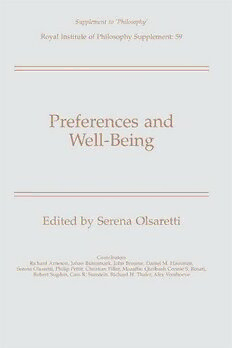
Preferences and Well-Being PDF
286 Pages·2006·1.347 MB·English
Most books are stored in the elastic cloud where traffic is expensive. For this reason, we have a limit on daily download.
Preview Preferences and Well-Being
Description:
Preferences are often thought to be relevant for well-being: respecting preferences, or satisfying them, contributes in some way to making people's lives go well for them. A crucial assumption that accompanies this conviction is that there is a normative standard that allows us to discriminate between preferences that do, and those that do not, contribute to well-being. The papers collected in this volume, written by moral philosophers and philosophers of economics, explore a number of central issues concerning the formulation of such a normative standard. They examine what a defensible account of how preferences should be formed for them to contribute to well-being should look like; whether preferences are subject to requirements of rationality and what reasons we have to prefer certain things over others; and what the significance is, if any, of preferences that are arational or not conducive to well-being.
See more
The list of books you might like
Most books are stored in the elastic cloud where traffic is expensive. For this reason, we have a limit on daily download.
